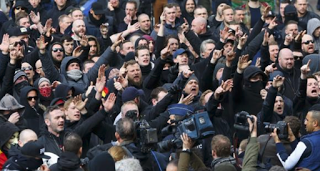The Global Incomprehension of Increasing Violence. Terror Attacks, Why?
Matching incapacity to question the reason why

Writing from the recently acclaimed epicentre of terrorism in Europe, it is remarkable to note the astonishment widely expressed as to the reason behind the attacks in Brussels on 22 March 2016 — as was the case with regard to the attacks in Paris in 2015, or indeed in the earlier case of 9/11.
The question in the minds of many is “why” such irrational attacks are so unreasonably made against innocents. The title of this note is usefully ambiguous, however, for it also holds the more crucial question as to why so little effort is made to address the question of “why”. This is to be compared with efforts to detect and constrain perpetrators by any feasible means — “closing the stable door after the horse has bolted“. The resources allocated to the detection of threat, and the associated investment in security resources, are many orders greater than those devoted to understanding violence and the many forms it may take.
To the extent that there is a sense of being trapped by the degree of violence in society, and the fear it engenders, a valuable insight is offered by policy scientist Geoffrey Vickers: A trap is a function of the nature of the trapped (Freedom in a Rocking Boat: changing values in an unstable society, 1972).
The question here is whether it is in the nature of people not to want to know “why”? Is this because of the fear of change potentially implied? Unknowingly, have we seen the enemy and “them is us — as might be concluded from the argument of John Ralston Saul (The Unconscious Civilization, 1995)? Are there unknowns so terrifying that humanity has no desire to know of them — because of the transformation for which it calls?
Are people unduly content with more superficial responses — those that require little new thinking — as argued by Susan Buck-Morss (Thinking Past Terror, 2006)? Are we then content with the obvious reactions to which they give rise — however unfruitful they may prove to be in the longer term? Is “shooting first” the better strategy when “we are at war” — postponing any more radical questions until later? Or should the ongoing quest for answers by authorities be systematically challenged by the oft-quoted remarks of Albert Einstein:
- To repeat the same thing over and over again, and yet to expect a different result, this is a form of insanity.
- The significant problems we face can not be solved at the same level of thinking we were at when we created them.
What factors reinforce this incapacity to explore “why” in any depth and why is so little effort made to do so? What might it mean to understand why there is so little effort to comprehend the global indulgence in violence? Would real understanding imply a transformation in thinking so terrifying that such comprehension is systematically avoided, as separately argued (Thinking in Terror, 2005)?
Ironically, given the terror engendering the rising number of refugees arriving in Europe as a consequence of the policies of Brussels-based institutions, “epicentre of terrorism” might indeed be an appropriate expression — perceived otherwise, if unreasonably so.
To Read the Complete Article, click here

